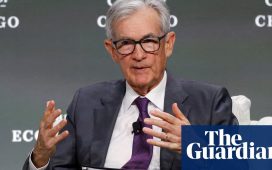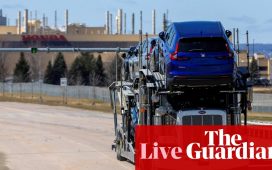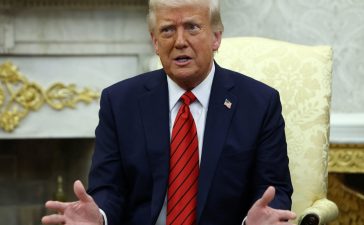Introduction: Hunt announces £360m manufacturing funding package in growth push
Good morning, and welcome to our rolling coverage of business, the financial markets and the world economy.
As Budget Week begins, the British government has announced a new investment package to help make the UK “a world leader in manufacturing”.
Worth a combined £360m from government and industry, the funding will support R&D and manufacturing projects in sectors where the UK is or could be world-leading, by unlocking investment from the private sector.
It includes almost £200m for aerospace R&D projects, to fund the development of energy efficient and zero-carbon aircraft technology needed to achieve net zero aviation.
There’s also £73m of joint funding for “cutting-edge automotive R&D projects” for electric vehicle technology, to make them more efficient and competitive.
The Treasury explains:
Supported by more than £36 million of government funding awarded through Advanced Propulsion Centre UK (APC) competitions, this includes four projects which are developing technologies for the next generation of battery electric vehicles, making them more efficient and competitive, led by companies including automotive manufacturers YASA and Empel Systems.
[This comes six months after prime minister Rishi Sunak’s green u-turn, when he delayed banning the sale of new petrol and diesel cars by five years to 2035].
The government is also contributing £7.5m to help two pharmaceutical companies to spend £84m to expand their UK plants; Almac, a pharmaceutical company in Northern Ireland produces drugs to treat diseases such as cancer, heart disease and depression, while Ortho Clinical diagnostics of Pencoed, Wales, produces medical testing products.
Chancellor of the Exchequer Jeremy Hunt says the money will help secure jobs and grow the economy:
“We’re sticking with our plan by backing the industries of the future with millions of pounds of investment to make the UK a world leader in manufacturing, securing the highly-skilled jobs of the future and delivering the long-term change our country needs to deliver a brighter future for Britain”.
The economy certainly needs more investment; last summer, the IPPR think tank warned that the UK is bottom of G7 league table for business investment, leaving the country in a growth doom loop.
Back in the Autumn Statement last November, the UK announced £4.5bn to increase investment in strategic manufacturing sectors – auto, aero, life sciences and clean energy.
But Labour’s shadow business secretary Jonathan Reynolds, isn’t impressed by today’s announcement; he says the government is “incapable of providing the long-term stability manufacturing needs to thrive”.
Reynolds added:
“Recycled announcements won’t be enough to turn around the lowest business investment in the G7.”
The funding announcement comes as Hunt puts the finishing touches to Wednesday’s budget, with Tory MPs pushing the chancellor to produce some voter-pleasing tax cuts.
But is 1p, or more, off income tax really what people want, given the state of UK public services?
An opinion poll of almost 5,000 people across Britain released by the Joseph Rowntree Foundation (JRF) this morning shows that almost three quarters were “very worried” or “fairly worried” about funding for the NHS and other public services, compared with less than half who were concerned about tax on earnings.
JRF are warning Hunt that his budget risks condemning Britain to a second “lost decade” for living standards.
Hunt himself said yesterday he wants to move Britain towards becoming a lower-tax economy, “as and when we can afford it”….
Key events
Larry Elliott: Hunt scrambling to fund pre-election tax cuts
The Treasury has been exploring every avenue in its attempt to find a way of putting more money in the pockets of consumers while sticking to its self-imposed rule to be cutting debt as a share of national income in five years’ time, our economics editor Larry Elliott write.
But, experience suggests this strategy won’t work, he points out:
For a start, the sums involved will be relatively modest. The size of Hunt’s net giveaway on Wednesday is likely to be a maximum of £10bn, which is small beer in the context of a £2.5tn-a-year economy.
The package will be smaller than last November’s autumn statement, which made no difference to the Conservative party’s dire opinion poll ratings.
Plus, the country is not in the same state as 1987, when Nigel Lawson cut taxes in a giveaway budget. More here.
Siemens announces £100m investment for R&D facility in Britain
Jack Simpson
Siemens has announced it will invest £100m in a new centre for manufacturing in Wiltshire.
The global technology company will use the money to replace its current factory in Chippenham, with the new facility on the site expected to be completed by 2026.
The current Chippenham factory is the country’s only factory dedicated to developing rail signalling and control systems, and manufactured the signalling technology currently being used on the Elizabeth line.
It has also been a key site for the development of railway technology since the Victorian times. Its current workload includes providing new digital signalling equipment to modernise the east coast main line from London to Edinburgh.
When operational in 2026, the 800 manufacturing, research and engineering jobs at the current factory will be transferred to the new site without an impact on production.
Joint CEO of Siemens Mobility UK & Ireland, Rob Morris, said:
“This investment is a strong commitment to Chippenham and our country.
“Siemens Mobility’s Chippenham site, along with our 30 sites across the country, has been transforming rail, travel, and transport in Britain – and it will continue to do so with cloud-based rail technology connecting the real and the digital worlds, digitalizing rail.”
🚨 @SiemensMobility to invest £100m in a new, cutting-edge manufacturing & R&D facility in Chippenham, to build the next generation of digital railway signalling systems.
This will:
✅Support jobs
✅Better connect communities
✅Transform rail travel on the East Coast Main Line pic.twitter.com/VHVqEgKnoE— HM Treasury (@hmtreasury) March 4, 2024
Jeremy Hunt has also welcomed Siemens’ decision, calling it “a big boost for Britain’s world-class manufacturing sector”.
Introduction: Hunt announces £360m manufacturing funding package in growth push
Good morning, and welcome to our rolling coverage of business, the financial markets and the world economy.
As Budget Week begins, the British government has announced a new investment package to help make the UK “a world leader in manufacturing”.
Worth a combined £360m from government and industry, the funding will support R&D and manufacturing projects in sectors where the UK is or could be world-leading, by unlocking investment from the private sector.
It includes almost £200m for aerospace R&D projects, to fund the development of energy efficient and zero-carbon aircraft technology needed to achieve net zero aviation.
There’s also £73m of joint funding for “cutting-edge automotive R&D projects” for electric vehicle technology, to make them more efficient and competitive.
The Treasury explains:
Supported by more than £36 million of government funding awarded through Advanced Propulsion Centre UK (APC) competitions, this includes four projects which are developing technologies for the next generation of battery electric vehicles, making them more efficient and competitive, led by companies including automotive manufacturers YASA and Empel Systems.
[This comes six months after prime minister Rishi Sunak’s green u-turn, when he delayed banning the sale of new petrol and diesel cars by five years to 2035].
The government is also contributing £7.5m to help two pharmaceutical companies to spend £84m to expand their UK plants; Almac, a pharmaceutical company in Northern Ireland produces drugs to treat diseases such as cancer, heart disease and depression, while Ortho Clinical diagnostics of Pencoed, Wales, produces medical testing products.
Chancellor of the Exchequer Jeremy Hunt says the money will help secure jobs and grow the economy:
“We’re sticking with our plan by backing the industries of the future with millions of pounds of investment to make the UK a world leader in manufacturing, securing the highly-skilled jobs of the future and delivering the long-term change our country needs to deliver a brighter future for Britain”.
The economy certainly needs more investment; last summer, the IPPR think tank warned that the UK is bottom of G7 league table for business investment, leaving the country in a growth doom loop.
Back in the Autumn Statement last November, the UK announced £4.5bn to increase investment in strategic manufacturing sectors – auto, aero, life sciences and clean energy.
But Labour’s shadow business secretary Jonathan Reynolds, isn’t impressed by today’s announcement; he says the government is “incapable of providing the long-term stability manufacturing needs to thrive”.
Reynolds added:
“Recycled announcements won’t be enough to turn around the lowest business investment in the G7.”
The funding announcement comes as Hunt puts the finishing touches to Wednesday’s budget, with Tory MPs pushing the chancellor to produce some voter-pleasing tax cuts.
But is 1p, or more, off income tax really what people want, given the state of UK public services?
An opinion poll of almost 5,000 people across Britain released by the Joseph Rowntree Foundation (JRF) this morning shows that almost three quarters were “very worried” or “fairly worried” about funding for the NHS and other public services, compared with less than half who were concerned about tax on earnings.
JRF are warning Hunt that his budget risks condemning Britain to a second “lost decade” for living standards.
Hunt himself said yesterday he wants to move Britain towards becoming a lower-tax economy, “as and when we can afford it”….








